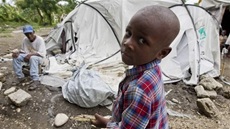Displacement and Development in the Republic of NGOs (Megan Bradley)
 Below is a blog by Brookings Institution Fellow Megan Bradley concerning her most recent trip to Haiti. She reminds us that even now 369,000 Haitians remain displaced. Finding durable solutions for their plight is a critical element of Haiti's ongoing recovery and long-term development. While NGOs can help, doing so requires, above all, a stronger Haitian state.
Below is a blog by Brookings Institution Fellow Megan Bradley concerning her most recent trip to Haiti. She reminds us that even now 369,000 Haitians remain displaced. Finding durable solutions for their plight is a critical element of Haiti's ongoing recovery and long-term development. While NGOs can help, doing so requires, above all, a stronger Haitian state.
Haiti is often nicknamed the "republic of NGOs." Since the earthquake of 12 January 2010, the number of NGOs – mostly relief and development groups – working in Haiti exploded from 3,000 to an estimated 10,000. Touching down in Port-au-Prince on Friday, it struck me that Haiti, or at least its capital, could also be known as the republic of rebar. Across the cityscape, rebar protrudes from thousands of roofless buildings, attesting to the progress made since the earthquake that virtually flattened the city and killed 223,000, but also the work that remains to be done.
Last month, former President Bill Clinton’s Office of the UN Special Envoy for Haiti, announced that almost half of the $12.32 billion pledged by governments for relief and recovery in Haiti from 2010 to 2020 has now been disbursed. The amount of aid delivered in Haiti in 2010 alone outstripped the country's total internal revenue by four times. This considerable expenditure has not yielded a coherent response to one of the country's greatest post-disaster challenges: Haiti's housing crisis. 1.5 million people were displaced by the earthquake and its aftershocks. Now, more than two and a half years later, 369,000 remain displaced. They are sheltered in tent cities in Port-au-Prince and on crowded sidewalks in shanties made with tarps emblazoned with the logos of the republic's many NGOs, and the words "From the American people."
Scattergun efforts have been made to resolve the persistent displacement problem, including the eviction of thousands encamped in public squares. Some have benefitted from efforts to repair 15,000 of the 200,000 homes damaged or destroyed by the quake. Others have accessed grants to enable them to move into rental apartments for one year. What will happen after the year is up remains to be seen.
One of the most controversial strategies embraced by the Haitian government and its international supporters has been to push against the tide that has over past decades brought untold scores of Haitians from the impoverished countryside to the capital, leaving Port-au-Prince impossibly, almost unbelievably, crowded. Many programs have incentivized relocation to rural communities, offering housing and other forms of critically needed support to those willing to leave the city.
Conversations I've had with Haitians this week in villages between Port-au-Prince and Léogâne, the epicenter of the quake, highlight the promise and peril of this strategy. Many Haitians are remarkably eager to return to – or stay in – their towns and villages. The issue now, as it was before the quake, is the lack of work and development opportunities across the country, but particularly outside the cities. Even in this "republic of NGOs," the reach of NGO-supported development initiatives remains modest – almost as modest as the reach of the Haitian state into its rural communities. It is increased support for sustainable livelihoods – through NGOs but above all through a strengthened Haitian state – that is essential to durable solutions for those who remain in the tent cities and sidewalk shanties. That only ten percent of earthquake recovery funds to date have been channeled through the government of Haiti should caution against optimism that the government will be able to shoulder this responsibility any time soon.
One of the brightest and most energetic young men I met in the Haitian countryside this week admitted that while he dreams of working as an engineer, upon graduation he will likely have to follow the national trend and "go home and sit down." Haitians like the young man I met want to work to create viable futures for themselves and their families outside the compacted chaos of Port-au-Prince. Resolving the country's lingering displacement crisis requires this challenge be met head on.
Add new comment